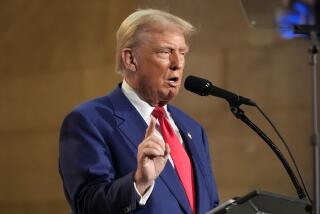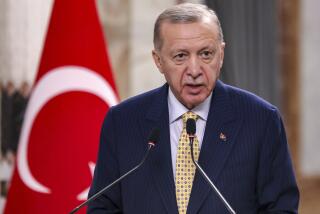President Asks Allies to Join in Healing World Economy : Growth: On eve of trade talks, Clinton calls on Japan and Europe to lower interest rates, end protectionism.
President Clinton, in a direct appeal to Europe and Japan on the eve of an international meeting of finance ministers, said Friday that the United States is taking steps to put its fiscal house in order and asked allied governments to do their part to improve the world economy.
In a speech to students at American University, Clinton denounced protectionist practices and expressed support for global trade talks and a pending free trade pact with Mexico and Canada, saying America “must compete, not retreat.”
But now that his Administration is responding to requests from world leaders to reduce the U.S. budget deficit and make productive new investments, Clinton said, the allies should reciprocate by lowering interest rates and pursuing pro-growth strategies.
Clinton’s remarks came as trade ministers and central bankers of the seven largest industrial nations, including Treasury Secretary Lloyd Bentsen and Federal Reserve Chairman Alan Green span, prepared to meet today in London. Some of his comments were clearly intended for the foreign officials.
With the United States poised to cut its deficit, Clinton said, the Japanese and Germans must do their share--a broad hint that the Germans should cut their interest rates and the Japanese must increase government spending.
“It will be difficult for us to grow coming out of this recovery unless we can spark a renewed round of growth in Europe and in Japan,” he said. “We have got to try to work more closely together.”
If his economic plan is adopted, Clinton said, “I will be able to say to my counterparts, ‘You have been telling us for years that America must reduce its debt and put its own house in order. . . . We have done it . . . . Now you must work with us in Germany and Japan and other nations to promote global growth.”
The President delivered his 40-minute speech at the university where President John F. Kennedy 30 years ago delivered an often-cited speech on arms control and America’s role in the Cold War. In those remarks, delivered June 10, 1963, Kennedy offered the Soviets the promise of peace while vowing the United States intended to remain strong.
Clinton’s speech was his fullest statement to date on trade policy. He strongly criticized protectionism but insisted the United States must negotiate aggressively as it strives to makes its work force more competitive and expand the world economy.
Signaling an aggressive approach, however, he blamed his predecessors for remaining inactive while other nations built trade barriers and unfairly subsidized the export of goods at the expense of U.S. workers.
The administrations of Ronald Reagan and George Bush believed “government should do nothing in the face of foreign competition, no matter what the dimension and shape of that competition is, no matter what the consequences are in terms of job losses, trade dislocations, or crushed incomes,” Clinton said.
In an age of ever-closer international ties, the United States will prosper only if it invests in the education and training of its work force and promotes economic growth through the rest of the world, he said. But he made it clear that the foundation of his trade policy would be to beat down trade barriers, first through negotiations and then through retaliation.
His approach, Clinton said, would “not be a policy of blame but one of responsibility. It will say to our trading partners that we value their business, but none of us should expect something for nothing.”
Clinton said Americans are justifiably angry about the relocation of manufacturing operations overseas and resentful that prosperity abroad seems to mean poverty at home.
“It is ironic and even painful that the global village we have worked so hard to create has done so much to be the source of higher unemployment and lower wages for some of our people,” Clinton said.
In arguing that the country needs to contribute to the health of the world economy, Clinton made a particular bid for aid to Russia. If democracy fails in Russia, he said, “the world will suffer.”
Clinton said the United States stands at “a third great moment of decision in the 20th Century.” The first came after World War I, he said, when the nation made the wrong choice in isolationism.
The second was after World War II, when America helped rebuild the world economy and establish new world institutions. This time, with the close of the Cold War, the nation should “repeat the success of the 1950s by reaching outward and improving ourselves as well.”
Mickey Kantor, Clinton’s former campaign chairman and now U.S. trade representative, said the speech marked a “sea change” in American foreign and economic policy.
“It is clear this President understands the post-Cold War world,” Kantor said in a meeting with reporters after the American University address. “America is going to assert its leadership in the world economy.”
Clinton’s remarks put in context a number of early Administration moves on trade that until now had appeared to signal that he would pursue a hostile and protectionist trade policy. Those moves included:
--A decision earlier this month to limit European access to some U.S. government procurement, an action made in protest of restrictive European rules on government purchasing.
--Commerce Secretary Ronald H. Brown’s apparent encouragement of U.S. industries to file lawsuits against foreign competitors suspected of selling underpriced goods in the United States.
--Clinton’s statement supporting renewal of a trade law provision known as “Super 301” that allows prompt retaliation against nations that limit imports of American products.
--Clinton’s harsh criticism Monday of Europe’s heavily subsidized Airbus aircraft consortium, which he said cost the jobs of thousands of Boeing Co. aircraft workers. Kantor said Thursday that the United States wanted to reopen an agreement with Europe that temporarily cooled the long-simmering dispute over Airbus subsidies.
Kantor said all these actions were not designed to limit access to American markets. Rather, the Clinton Administration intends to allow relatively free flow of foreign goods while moving aggressively to beat down foreign trade barriers.
Paula Stern, a Clinton trade adviser and former chairwoman of the International Trade Commission, said Clinton’s intention was to assert a three-part “international economic policy.” It would consist of expanded spending on the education and training needed to make American products competitive, a broader effort to expand the global economy, and a broader effort on trade negotiations.
ECONOMY GROWING: The U.S. economy posted its strongest showing in five years in the fourth quarter. D1
Clinton’s Five Steps
President Clinton laid out his world economic philosophy Friday, listing five steps that had to be taken to “set a new direction at home and help create a new direction for the world.” These are the steps: 1. Get the U.S. economic house in order by increasing investment and cutting the budget deficit as set forth in Clinton’s economic plan. 2. Make trade a priority element in American security, avoiding the extremes of both protectionism and government inaction in seeking to create a more open trading system. 3. Lead the way to improved coordination with major financial powers to boost world economic growth, especially in Europe and Japan. 4. Promote steady growth expansion in the developing world, including aid policies that do more to address population pressures, the environment, accountable government and fairer distribution of wealth. 5. Help promote democracy and economic reform in Russia and other former Soviet republics, with aid linked to reform, arms control and non-proliferation of weapons.
More to Read
Get the L.A. Times Politics newsletter
Deeply reported insights into legislation, politics and policy from Sacramento, Washington and beyond. In your inbox three times per week.
You may occasionally receive promotional content from the Los Angeles Times.











